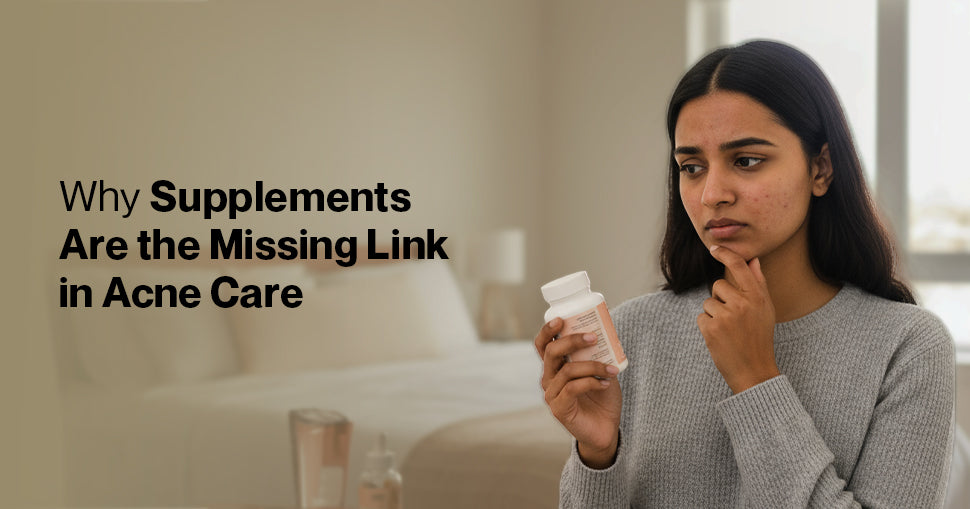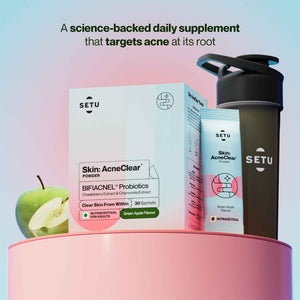Why Supplements Are the Missing Link in Acne Care
23 Sep 2025
For decades, acne treatment has focused primarily on topical solutions and harsh medications. While cleansers, spot treatments, and prescription drugs can provide temporary relief, many people find themselves trapped in an endless cycle of breakouts, wondering why their skin never seems to achieve lasting clarity. The answer may lie not in what we put on our skin, but in what we put into our bodies.
Emerging research suggests that supplements could be the missing piece of the acne puzzle, addressing the root causes of breakouts from within rather than simply managing symptoms on the surface. This inside-out approach to acne care represents a shift that could revolutionize how we think about achieving clear, healthy skin.
The Limitations of Traditional Acne Treatments
Most conventional acne treatments work by targeting the visible symptoms of acne rather than addressing underlying causes. Topical treatments like benzoyl peroxide and salicylic acid can reduce bacteria and unclog pores, but they often come with side effects like dryness, irritation, and increased sensitivity. More aggressive treatments like retinoids and antibiotics can be effective but may disrupt the skin barrier or create antibiotic resistance over time.
The problem with this approach is that it treats acne as purely a surface-level skin condition, when in reality, acne is often a reflection of internal imbalances. Factors like hormonal fluctuations, nutritional deficiencies, inflammation, and gut health all play crucial roles in skin health, yet traditional treatments largely ignore these underlying contributors.
This is where supplements enter the picture as a complementary approach that addresses acne from the inside out, targeting the root causes that topical treatments simply cannot reach.
The Science Behind Internal Acne Causes
To understand how supplements can help with acne, it's important to recognize the internal factors that contribute to breakouts. Acne development involves four key processes: excess oil production, clogged pores, bacterial overgrowth, and inflammation. While these processes occur in the skin, they are heavily influenced by internal factors.
Hormonal imbalances, particularly elevated androgens like testosterone and DHT, can trigger increased sebum production. Insulin spikes from high-glycemic foods can worsen hormonal acne by increasing androgen activity. Chronic inflammation throughout the body often manifests in the skin, while nutritional deficiencies can impair the skin's ability to heal and maintain its protective barrier.
The gut-skin axis has also emerged as a critical connection in acne development. An imbalanced gut microbiome can lead to increased intestinal permeability, allowing toxins and inflammatory compounds to enter the bloodstream and potentially trigger skin inflammation.
Key Supplements for Acne Prevention and Treatment
Several supplements have shown promise in clinical studies for improving acne by addressing these internal factors.
Zinc is perhaps the most well-researched supplement for acne. This essential mineral has anti-inflammatory properties and helps regulate hormone production. Studies have shown that people with acne often have lower zinc levels than those with clear skin. Zinc supplementation can help reduce inflammation, control oil production, and support wound healing. The recommended dose typically ranges from 30-40mg daily, preferably taken with food to minimize stomach upset.
Probiotics represent an exciting frontier in acne treatment by supporting gut health and the gut-skin axis. Certain strains of beneficial bacteria can help reduce inflammation, improve nutrient absorption, and even influence hormone metabolism. Studies have shown that specific probiotic strains can improve acne severity when taken consistently over several months.
Chasteberry (Vitex agnus-castus) is another powerful supplement for hormonal acne, especially in women experiencing breakouts related to their menstrual cycle. This herb works by supporting the pituitary gland and helping to balance progesterone and estrogen levels. Chasteberry is particularly effective for women who experience premenstrual acne flares, as it can help regulate the hormonal fluctuations that trigger these cyclical breakouts. Studies suggest that consistent use over several months can lead to significant improvements in hormone-related acne.
Vitamin A and its precursor beta-carotene support skin cell turnover and may help prevent clogged pores. While high doses of vitamin A can be toxic, moderate supplementation or increased consumption of beta-carotene-rich foods can be beneficial.
The Holistic Approach: Supplements as Part of a Comprehensive Strategy
While supplements can be powerful tools in the fight against acne, they work best as part of a comprehensive approach to skin health. This holistic strategy should include a balanced diet rich in anti-inflammatory foods, adequate hydration, stress management, and appropriate skincare practices.
Supplements should complement, not replace, a healthy lifestyle. They work most effectively when combined with dietary changes that reduce inflammation and support hormone balance, such as limiting dairy and high-glycemic foods while increasing consumption of antioxidant-rich fruits and vegetables.
The timing and consistency of supplement use is also crucial. Unlike topical treatments that may show results within days or weeks, supplements typically require 2-3 months of consistent use to show significant improvements in acne. This is because they work by gradually correcting internal imbalances rather than providing immediate symptomatic relief.
Addressing Safety and Individual Needs
Not all supplements are appropriate for everyone, and it's important to approach supplementation thoughtfully. Some supplements can interact with medications or may not be suitable for certain health conditions. For example, high doses of vitamin A can be harmful during pregnancy, and zinc supplementation can interfere with copper absorption if taken long-term without proper balance.
The quality of supplements also matters significantly. Look for third-party tested products from reputable manufacturers, and consider working with a healthcare provider who can help determine which supplements might be most beneficial based on individual health status and acne patterns.
Some people may benefit from testing for specific nutritional deficiencies before starting supplementation, as this can help target the most relevant supplements and appropriate dosing.
The Future of Acne Treatment
As our understanding of the gut-skin axis and internal contributors to acne continues to evolve, supplements are likely to play an increasingly important role in acne treatment protocols. Personalized approaches based on individual microbiome testing, hormone profiles, and nutritional status may become more common, allowing for more targeted and effective supplementation strategies.
The integration of supplements into acne care represents a shift toward treating the whole person rather than just the skin condition. This approach acknowledges that lasting skin health requires addressing the complex interplay between nutrition, hormones, inflammation, and gut health.
Conclusion
Supplements like Setu Skin: AcneClear represent a promising and often overlooked component of comprehensive acne care. By addressing internal factors like inflammation, hormonal imbalances, and nutritional deficiencies, supplements can help break the cycle of recurring breakouts that topical treatments alone cannot resolve.
While supplements are not a magic bullet for acne, they offer a valuable tool for addressing root causes rather than just managing symptoms. For those who have struggled with persistent acne despite trying various topical treatments, incorporating targeted supplements into their routine may provide the missing link to achieving clearer, healthier skin.
The key is approaching supplementation as part of a holistic strategy that includes proper nutrition, stress management, and appropriate skincare practices. With patience, consistency, and ideally professional guidance, supplements can help many people achieve the clear skin that has long eluded them through traditional treatments alone.
Skin: AcneClear - Powder
- ₹1,344
- ₹1,344
-
₹1,700 - ( 20% OFF)
Categories
- Choosing a selection results in a full page refresh.
- Press the space key then arrow keys to make a selection.
this is the sidecart
















